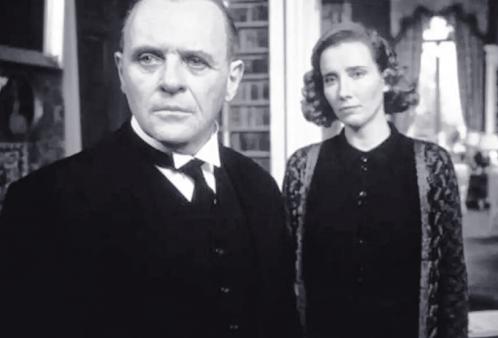长日将尽
By Kazuo Ishiguru
‘Look here, Stevens, it was dreadful. The ordeal(可怕的经历)we put you through last night.
I paused in what I was doing and said: ‘Not at all, sir. I was only too happy to be of service.
‘It was quite dreadful. Wed all had rather too good a dinner, I fancy. Please accept my apologies.
‘Thank you, sir. But I am happy to assure you I was not unduly inconvenienced.
His lordship walked over rather wearily to a leather armchair, seated himself and sighed. From my vantage point(观察某物的有利位置)up on my ladder, I could see practically the whole of his long figure caught in the winter sunshine pouring in through the french windows and streaking(使布满条纹,指阳光照射)much of the room. It was, as I recall it, one of those moments that brought home how much the pressures of life had taken their toll(造成损伤)on his lordship over a relatively small number of years. His frame, always slender, had become alarmingly thin and somewhat misshapen(畸形的), his hair prematurely white, his face strained and haggard(紧张和憔悴的). For a while, he sat gazing out of the french windows towards the downs(有草開阔的高地), then said again:

‘It really was quite dreadful. But you see, Stevens, Mr Spencer had a point to prove to Sir Leonard. In fact, if its any consolation, you did assist in demonstrating a very important point. Sir Leonard had been talking a lot of that old-fashioned nonsense. About the will of the people being the wisest arbitrator(仲裁人)and so on. Would you believe it, Stevens?
《长日将尽》是日裔英籍小说家石黑一雄的代表作,小说以英式贵族府邸达林顿府为背景,围绕男管家史蒂文斯六天驾车旅途中的回忆展开。史蒂文斯深受英国传统熏陶,极力效忠主人达林顿勋爵,在达林顿府30年的职业生涯里恪守职责、压抑自己的感情和亲情,为了不让父亲失望,为了做一名“杰出的男管家”,不惜牺牲与肯特小姐的爱情。史蒂文斯身上凝聚了英格兰贵族家庭里男管家的传统文化特征,体现了这一特殊职业的价值和尊严——尽最大努力为那些贵族绅士们提供尽可能好的服务,因为在他的心目中,这些绅士们掌握了人类文明的命运。
石黑一雄在这部作品中展现了主人公对英国贵族绅士文化的挚爱和深深眷恋。小说的语言精致优雅,感情细腻入微,对主人公的内心刻画入木三分,耐人寻味,读此书犹如在淡淡的夕阳中悠闲地品尝浓郁的英格兰下午茶。
本期节选了国际会议之后史蒂文斯与达林顿勋爵之间关于时政的一段对话,以及主人公对自己职业生涯的反思和职业道德的肯定,从中也可以看出达林顿对极权和专制的赞赏,还有对当时英国日渐兴起的民主思潮的不满和对英国前途的担忧。
‘Indeed, sir.
‘Were really so slow in this country to recognize when a things outmoded(过时的). Other great nations know full well that to meet the challenges of each new age means discarding old, sometimes well-loved methods. Not so here in Britain. Theres still so many talking like Sir Leonard last night. Thats why Mr Spencer felt the need to demonstrate his point. And I tell you, Stevens, if the likes of Sir Leonard are made to wake up and think a little, then you can take it from me(我敢保证)your ordeal last night was not in vain.
‘Indeed, sir.
Lord Darlington gave another sigh. ‘Were always the last, Stevens. Always the last to be clinging on to outmoded systems. But sooner or later, well need to face up to the facts. Democracy is something for a bygone(过去的)era. The worlds far too complicated a place now for universal suffrage(选举权,投票权)and such like. For endless members of parliament debating things to a standstill. All fine a few years ago perhaps, but in todays world? What was it Mr Spencer said last night? He put it rather well.
‘I believe, sir, he compared the present parliamentary system to a committee of the mothers union attempting to organize a war campaign.
‘Exactly, Stevens. We are, quite frankly, behind the times in this country. And its imperative that all forward-looking people impress this on the likes of Sir Leonard.
‘Indeed, sir.
‘I ask you, Stevens. Here we are in the midst of a continuing crisis. Ive seen it with my own eyes when I went north with Mr Whittaker. People are suffering. Ordinary, decent working people are suffering terribly. Germany and Italy have set their houses in order by acting. And so have the wretched(讨厌的)Bolsheviks(布尔什维克,指20世纪初拥护列宁及其政治观点的人)in their own way, one supposes. Even President Roosevelt, look at him, hes not afraid to take a few bold steps on behalf of his people. But look at us here, Stevens. Year after year goes by, and nothing gets better. All we do is argue and debate and procrastinate(耽擱,延迟). Any decent idea is amended to ineffectuality(修订之后变成无效)by the time its gone half-way through the various committees its obliged to pass through. The few people qualified to know whats what are talked to a standstill by ignorant people all around them. What do you make of it, Stevens?
‘The nation does seem to be in a regrettable condition, sir.
‘Ill say. Look at Germany and Italy, Stevens. See what strong leadership can do if its allowed to act. None of this universal suffrage nonsense there. If your house is on fire, you dont call the household into the drawing room and debate the various options for escape for an hour, do you? It may have been all very well once, but the worlds a complicated place now. The man in the street cant be expected to know enough about politics, economics, world commerce and what have you. And why should he? In fact, you made a very good reply last night, Stevens. How did you put it? Something to the effect(大概是这个意思)that it was not in your realm? Well, why should it be?

It occurs to me in recalling these words that, of course, many of Lord Darlingtons ideas will seem today rather odd—even, at times, unattractive. But surely it cannot be denied that there is an important element of truth in these things he said to me that morning in the billiard room. Of course, it is quite absurd to expect any butler to be in a position to answer authoritatively questions of the sort Mr Spencer had put to me that night, and the claim of people like Mr Harry Smith that ones ‘dignity is conditional on being able to do so can be seen for the nonsense it is. Let us establish this quite clearly: a butlers duty is to provide good service. It is not to meddle in(搅和,插一脚)the great affairs of the nation. The fact is, such great affairs will always be beyond the understanding of those such as you and I, and those of us who wish to make our mark(扬名,留下印记)must realize that we best do so by concentrating on what is within our realm; that is to say, by devoting our attention to providing the best possible service to those great gentlemen in whose hands the destiny of civilization truly lies. This may seem obvious, but then one can immediately think of too many instances of butlers who, for a time anyway, thought quite differently. Indeed, Mr Harry Smiths words tonight remind me very much of the sort of misguided idealism which beset(圍绕)significant sections of our generation throughout the twenties and thirties. I refer to that strand(组成部分,方面)of opinion in the profession which suggested that any butler with serious aspirations should make it his business to be forever reappraising(重新评估)his employer—scrutinizing the latters motives, analyzing the implications of his views. Only in this way, so the argument ran, could one be sure ones skills were being employed to a desirable end. Although one sympathizes to some extent with the idealism contained in such an argument, there can be little doubt that it is the result, like Mr Smiths sentiments tonight, of misguided thinking. One need only look at the butlers who attempted to put such an approach into practice, and one will see that their careers—and in some cases they were highly promising careers—came to nothing as a direct consequence. I personally knew at least two professionals, both of some ability, who went from one employer to the next, forever dissatisfied, never settling anywhere, until they drifted from view altogether. That this should happen is not in the least surprising. For it is, in practice, simply not possible to adopt such a critical attitude towards an employer and at the same time provide good service. It is not simply that one is unlikely to be able to meet the many demands of service at the higher levels while ones attentions are being diverted by such matters; more fundamentally, a butler who is forever attempting to formulate his own ‘strong opinionson his employers affairs is bound to lack one quality essential in all good professionals: namely, loyalty. Please do not misunderstand me here; I do not refer to the mindless sort of ‘loyalty that mediocre(中等的,平庸的)employers bemoan(惋惜)the lack of when they find themselves unable to retain the services of high-calibre(高水准的,高质量的)professionals. Indeed, I would be among the last to advocate bestowing ones loyalty carelessly on any lady or gentleman who happens to employ one for a time. However, if a butler is to be of any worth to anything or anybody in life, there must surely come a time when he ceases his searching; a time when he must say to himself: ‘This employer embodies all that I find noble and admirable. I will hereafter devote myself to serving him. This is loyalty intelligently bestowed. What is there ‘undignified in this? One is simply accepting an inescapable truth: that the likes of you and I will never be in a position to comprehend the great affairs of todays world, and our best course will always be to put our trust in an employer we judge to be wise and honourable, and to devote our energies to the task of serving him to the best of our ability. Look at the likes of Mr Marshall, say, or Mr Lane—surely two of the greatest figures in our profession. Can we imagine Mr Marshall arguing with Lord Camberley over the latters latest dispatch(派遣)to the Foreign Office? Do we admire Mr Lane any the less because we learn he is not in the habit of challenging Sir Leonard Gray before each speech in the House of Commons? Of course we do not. What is there ‘undignified, what is there at all culpable(应受责备的)in such an attitude? How can one possibly be held to blame in any sense because, say, the passage of time has shown that Lord Darlingtons efforts were misguided, even foolish? Throughout the years I served him, it was he and he alone who weighed up evidence and judged it best to proceed in the way he did, while I simply confined myself, quite properly, to affairs within my own professional realm. And as far as I am concerned, I carried out my duties to the best of my abilities, indeed to a standard which many may consider ‘first rate. It is hardly my fault if his lordships life and work have turned out today to look, at best, a sad waste—and it is quite illogical that I should feel any regret or shame on my own account.

